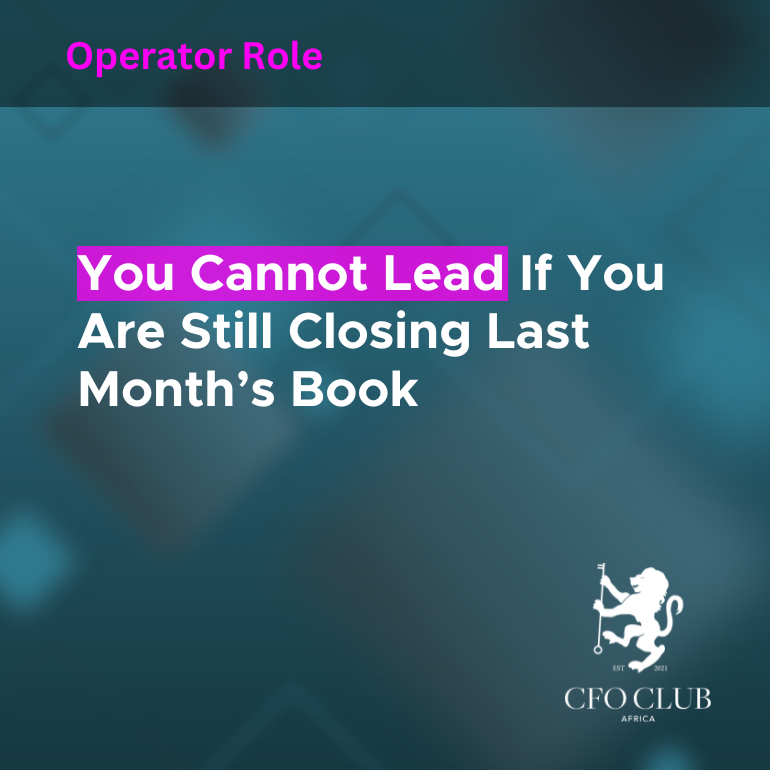You Cannot Lead If You Are Still Closing Last Month’s Book
You Cannot Lead If You Are Still Closing Last Month’s Book
The finance function is not judged by how well it reports the past, but by how quickly it can help the organisation move forward. Businesses do not just want accurate numbers. They want insight, delivered when it matters, in a way they can act on. And they expect it from the CFO.
A finance team that cannot keep up is seen as an operational risk. One that responds quickly and helps decision-makers take the right action is seen as a strategic partner. This shift in expectation has redefined what it means to be effective in finance.
Why Speed Matters
When a department needs a decision, they do not want a report two weeks from now. They need guidance today. If finance cannot respond with clear information and a workable answer, the business either delays the decision or makes it without the right input. Both outcomes come at a cost.
Being responsive means designing finance workflows around the needs of the business, not just accounting cycles. It means removing the friction that slows down reporting. It means simplifying how information is shared and focusing on what decision-makers actually need to know.
Finance has to keep pace with operations, sales, procurement, and project teams. When the business is dealing with disruption, pricing pressures, or budget constraints, finance should be the first place leaders turn to. And when they do, the answers must be ready.
What It Looks Like in Practice
A responsive finance function acts early. When a supplier cost increases, finance flags it and models the impact. When sales performance dips, finance breaks down the contributing factors. When cash flow starts tightening, finance outlines the trade-offs before problems escalate.
This does not require massive transformation. It begins with discipline. Reports should be ready in time to influence decisions, not just summarise them. Forecasts should reflect current conditions, not assumptions from last quarter. Internal communication should be built around solutions, not just compliance.
The best CFOs understand that responsiveness is not about working faster. It is about making sure the work being done is useful, timely, and delivered in a way that others can act on.
Delivering Results That Matter
Responsiveness without results is noise. The finance team might be busy, but that means nothing if it is not helping the business improve performance.
Real results show up in how well finance supports outcomes across the organisation. This includes helping teams lower costs, price correctly, allocate resources with more confidence, and respond to risks early. It is not enough to report variances. The question is, what did you help the business change because of them?
Results are not always measured in rands and cents. Often, they show up in speed of execution, improved planning, or better cross-functional decisions. These are outcomes that finance should be driving.
Changing the Way Finance Works
Too many finance teams still spend most of their time compiling information. By the time the work is done, the moment for action has passed. To be both responsive and results-driven, CFOs must change the way finance operates.
That starts with how teams use their time. Low-value work must be automated or removed. Reports must be reviewed for relevance. Forecasting cycles should be made shorter and more flexible. Decision-makers need tools that help them act, not documents that summarise the past.
Communication must also improve. Long reports and technical terms slow people down. Finance must speak in clear business language. Instead of describing a trend, explain what it means. Instead of reporting a number, suggest what to do about it.
These changes do not happen by accident. They come from the CFO setting a clear expectation that finance exists to support the business, not just monitor it.
Measuring the Right Things
Traditional finance KPIs such as cost control and reporting accuracy still matter. But if the team wants to be seen as valuable, it must start measuring the value it adds.
This includes how quickly finance responds to business requests, how many decisions are influenced by finance, and how clearly the team’s work helps others take action. If no one outside of finance is using the team’s output, that is a sign the work is not landing.
CFOs who track responsiveness and results internally can build stronger cases for investment in systems and people. More importantly, they can show how finance is contributing directly to growth, efficiency, and stability.
Shifting the Perception of Finance
When finance is slow or disconnected, it is seen as a blocker. When it is responsive and focused on outcomes, it becomes a trusted source of clarity and leadership.
CFOs need to ask whether their teams are involved early in key conversations, or only approached when a report is needed. They need to check if finance is known for helping solve problems or for raising compliance barriers. And they need to understand how the wider organisation experiences finance—whether it helps, or simply hands over data.
That perception changes when finance starts showing up differently. When it engages early. When it delivers insight that leads to action. When it demonstrates that it understands the business, not just the numbers.
A Final Word
CFOs are expected to be more than financial stewards. They are expected to be responsive, engaged, and focused on delivering business results that matter. This is not a future goal. It is a current expectation.
Those who meet this challenge will become trusted leaders inside their organisations. They will help steer their companies through uncertainty with confidence. And they will shape the future of finance as something far more impactful than a reporting function.
This is the time to make the shift. Review how finance engages with the business. Ask whether the work being done helps others take better action. And lead your team towards being the function that responds first and delivers results that matter.





